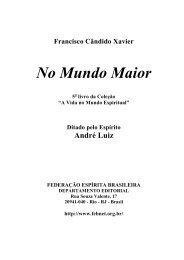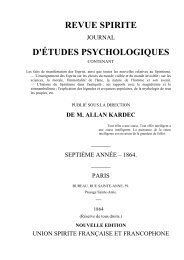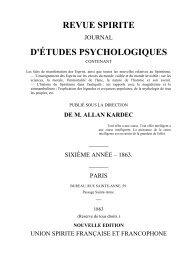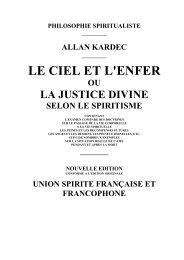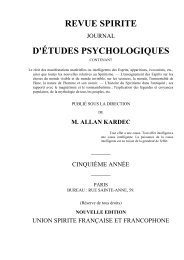PDF version - Geae
PDF version - Geae
PDF version - Geae
Create successful ePaper yourself
Turn your PDF publications into a flip-book with our unique Google optimized e-Paper software.
CHAPTER I<br />
THE EVOLUTION OF THOUGHT<br />
We have said that one law regulates the evolution of thought, as it regulates the physical evolution of<br />
beings and worlds. The comprehension of the universe is developed with the progress of the human mind. This<br />
general conception of the universe and of life has been expressed in a thousand fashions, under a thousand<br />
diverse forms in the past. It is expressed in larger terms today, and will be amplified in the measure that<br />
humanity climbs the pathway of ascension.<br />
Science enlarges without cessation its field of exploration. Every day, by the aid of powerful<br />
instruments of observation and analysis, science discovers new aspects of matter, of force, and of life. But that<br />
which those instruments record, the soul of man discovered long ago, for the flight of thought precedes always<br />
and surpasses the methods of positive science. The instruments know nothing, and are nothing, without the<br />
human will to direct them.<br />
Science is uncertain and changeable; it continually reconstructs itself. Its methods, its theories, its<br />
calculations, arrived at with great trouble, crumble before a more attentive observation, or a more profound<br />
deduction, to give place to other theories which are no more definite. 3 The theory of the undividable atom, for<br />
instance, which for two thousand years was the base of chemistry and physical science, is now qualified and<br />
considered mere romance by our most eminent scientists. Many analogous mistakes have demonstrated the<br />
weakness of the scientific mind in the past. That mind will never attain to reality but by lifting itself above the<br />
image of material facts toward the realms of Cause and Law.<br />
It is in this fashion that science has been able to determine the immutable principles of logic and<br />
mathematics. But it is not the same in the other orders of research. The scientist too often carries his<br />
prejudices, his personal tendencies, and his habits of routine into the domain of psychic research. This is<br />
particularly true of France, where there are indeed few scientists with the courage and the enlightenment<br />
sufficient to enable them to follow a pathway already traced by brilliant minds of other nations.<br />
Despite these facts, the human spirit advances step by step toward an understanding of itself and the<br />
universe. Our ideas of force and matter are modified each day, and human personality reveals itself under<br />
unexpected aspects. In the face of so much phenomena established by experimentation, in face of accumulated<br />
testimonials from all quarters, no clear-seeing intelligent mind can deny the proof of the survival of the soul, or<br />
elude the moral consequences and responsibility, which follow that fact. That which we say of science, can be<br />
equally said of the philosophies and the religions, which succeeded one another down the centuries. They<br />
constitute so many steps or stations pursued by humanity still in its infancy - steps leading up toward spiritual<br />
planes, growing more vast and elevated at each turn.<br />
The diverse beliefs of humanity are but the gradual development of the divine ideal reflected in the<br />
thoughts with more and more purity and brightness as the mind develops in refinement. The belief and the<br />
understanding of a period of time represent the measure of truth which men of that epoch can seize and<br />
comprehend, until the development of their faculties and their consciences enables them to perceive a higher<br />
form and a more intense radiation of the truth.<br />
Seen from this point of view, even early fetishism explains itself, despite its bloody rites. It is the first<br />
babbling of the infantine soul, striving to spell the divine language, and to give in forms appropriates to its<br />
own mental state its vague, confused, rudimentary conception of a superior world. Paganism represents a more<br />
elevated conception, though exceedingly anthropomorphic. The pagan gods are all men, with the same<br />
passions and weaknesses; but even here the ideal of something higher is found. It brings a ray of eternal beauty<br />
to fertilize the world.<br />
Still higher is the Christian idea of sacrifice and renunciation. Greek paganism was the religion of<br />
radiant nature! Christianity is that of suffering humanity, a religion of tombs and crypts and catacombs, born<br />
from the persecution and the sorrow it has suffered, and keeping the imprint of its origin.<br />
3 Professor Richet says: ‘Science has ever been a series of errors and approximations, constantly in a state of evolution, constantly overturning<br />
themselves, and changing more quickly than they form.’<br />
15



